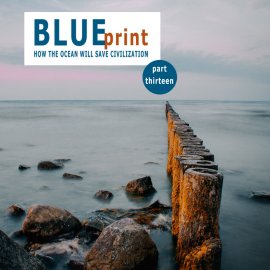The Quest for Solutions
-
English
-
ListenPause
[intro music] Welcome to World Ocean Radio… I’m Peter Neill, Director of the World Ocean Observatory. Problems demand solutions which, in turn, demand recognition of the challenge to hand, a serious determination to seek a serious response, and courage to explore alternatives, inventions, and change. If the challenge is to be met by equitable solution, then a complete examination of past behaviors must be a first step toward the creation of new ones, an understanding of the core premises of past failures, the foundations on which old structures and patterns were built and the flawed assumptions on which they have stood. We are faced essentially with a value proposition. We have believed in and acted upon certain ideas historically beneficial until they were not: democracy, social betterment, public health, equality of income and access -- all promoted as the basis for goals and aspirations, policies, laws, ideologies, and social/political action. For centuries, we practiced this intention, in some instances dramatically realized, in others not advanced at all beyond the illusion of best intent. We have been a racist culture since the beginning. We have capitalized the differentiation of opportunity, education, labor, and access to a proverbial dream in one iteration after another to reach a point today where inequity abounds and these institutions are suspect. The old value system was based on growth, driven primarily by consumption enabled by exploitation or extraction of natural resources: the fertile land, abundant water, timber, oil, coal, and other minerals, now all under stress, near exhaustion. Population density, global exchange of goods and services to stoke the economic engine, now exacerbated by consequent climate change and pandemic, have brought us to the edge, regardless of origin, place, class, or condition. This must change. As I have argued before, a new paradigm must be defined, accepted, and shared: managed growth, based on the conservation and sustainability of all natural resources, particularly the freshwater/ocean continuum without which society, from individual to family to world community cannot survive. There are hopeful signs of this transfer of priority and purpose: citizen actions and initiatives that challenge the status quo; the market reality of transfer of energy generation to alternatives that confront past consequence and enhance volume, viability, and vitality as counter-force for change. The inevitability of mitigation and adaptation strategies are surpassed by invention of new technology, process, and communication. Political movements are borne. Citizen initiatives are begun. New leaders emerge. New ideas are encouraged and welcomed by corporate and social innovators who see new value and powerful return in new investment. My optimism is driven by youth movement and engagement at all levels of governance that will overturn the regressive context of fear and failure and take opportunity and their future in hand. We either join them or get out of the way. It easy to say, but harder to do, and these efforts must be augmented by new tools beyond conventional legislation and political agenda. What are these new tools for value change and implementation? Over the next few weeks, I will try to enumerate and articulate them here and address what basic attitude shifts and innovations will be required to enable progress. Here are some questions to be asked and answered: How will we structure a new economy, from its linear connection as measured by gross national product, financial investment returns and market fluctuations to a circular connection as measured by increased standards of living, social investment return, and integrated markets that distribute, sustain, and guarantee goods and services beyond speculation into the future? How will we assess and account for what is the real cost and true profit for everyone within the system? How will we use these tools to retro-fit our infrastructure and existing systems and to apply to the realization of future innovation? How will we catalyze and incentivize change? How will we account for the complete reconciliation of profit and loss? How will we apply value tools as management guidelines and employment practices? How will we negotiate contracts and agreements at every level of a fully integrated economy and society? How will we regulate and adjudicate abuse and illegality? How will we provide equal justice for all? These questions must be answered as a core response to the problem, after which true change can, and will follow. We will discuss these issues, and more, in future editions of World Ocean Radio. [outro music]
This week on World Ocean Radio: part thirteen of the multi-part BLUEprint series. In this episode we ask listeners to consider implementation of a new paradigm of managed growth based on the conservation and sustainability of all natural resources—particularly the ocean-fresh water continuum—if we are to experience attitude shifts and innovations that will enable progress toward a sustainable future.

The "BLUEprint Series: How the Ocean Will Save Civilization" outlines a new and sustainable path forward, with the ocean leading the way.
About World Ocean Radio
Since 2009, a weekly 5-minute podcast covering a broad spectrum of ocean issues from science and education to advocacy and exemplary projects. World Ocean Radio, a project of the World Ocean Observatory, is available for syndicated use at no cost by college and community radio stations worldwide. Contact director@thew2o.net if you are interested in becoming an affiliate or know of a radio station that should be broadcasting these episodes each week.
Image
Baltic Sea
Courtesy of Alexander Henke
unsplash.com/@jonnydd
- Login to post comments



